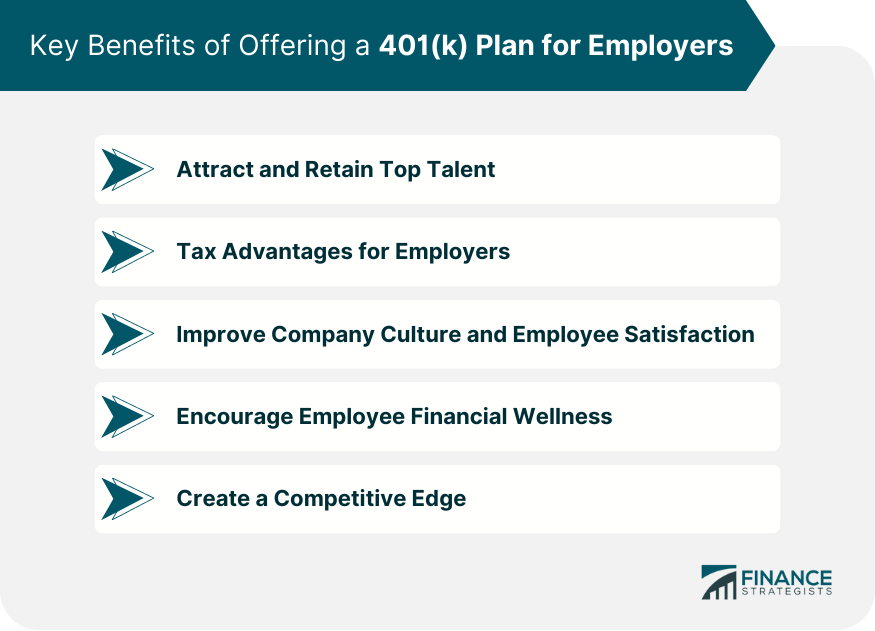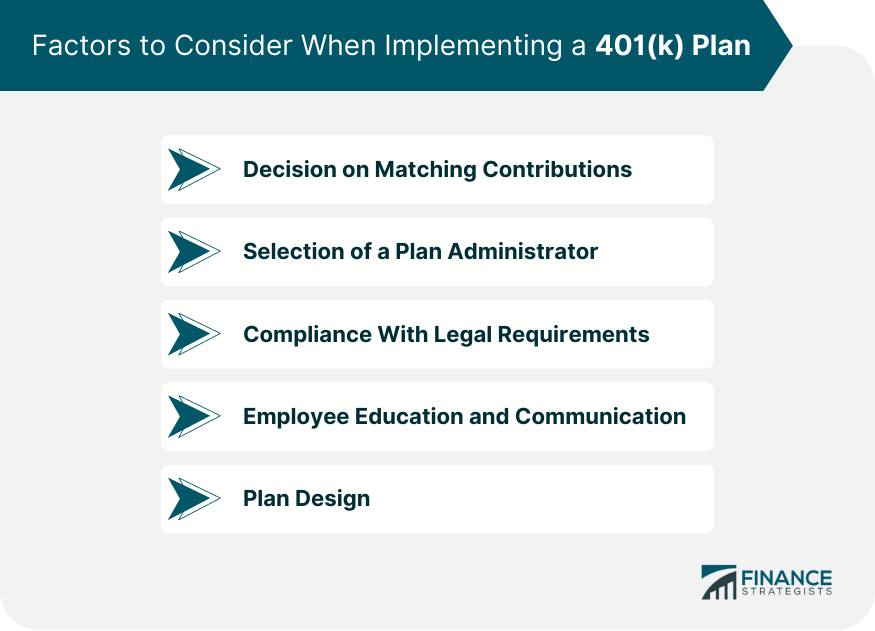A 401(k) plan is a retirement savings plan sponsored by an employer that allows employees to save and invest a part of their paycheck before taxes are taken out. This plan got its name from subsection 401(k) of the Internal Revenue Code, which was added into law in 1978. It quickly became popular as a retirement savings vehicle for American employees due to its tax advantages. An employee contributes a defined portion of their earnings to their 401(k) account. Often, employers will match a portion of employee contributions, increasing the potential for retirement savings. The money in these accounts is then invested in a variety of vehicles, such as stocks, bonds, and mutual funds, allowing for potential growth over time. A 401(k) plan is a powerful tool for attracting top talent to a company. In an economy where skilled workers have multiple employment options, offering a 401(k) plan can be a deciding factor for job seekers. It's a tangible way for an employer to demonstrate concern for their employees' long-term financial security and well-being. Moreover, offering a 401(k) plan aids in retaining employees. An employee who sees their 401(k) balance grow year after year is less likely to switch jobs and potentially lose out on that growth or the employer's matching contributions. Offering a 401(k) plan can have significant tax benefits for employers. First and foremost, employers can deduct their contributions to employees' 401(k) plans on their federal income tax return. This includes both matching contributions and any additional contributions the employer may make. Furthermore, earnings on the investments within a 401(k) plan are tax-deferred until withdrawal, which typically doesn't occur until retirement. This allows the investments to grow more rapidly than they might in a taxable account. A 401(k) plan can boost a company's culture and overall employee satisfaction. By offering a 401(k), an employer shows that they care about their employees' future, not just the work they're currently performing. This can lead to increased loyalty and a stronger commitment to the company's success. Moreover, a 401(k) plan can help employees feel more secure about their financial future. This peace of mind can reduce financial stress and lead to more productive, happier employees. 401(k) plans play a key role in promoting financial literacy and responsibility. By participating in a 401(k), employees learn important lessons about saving, investing, and planning for the future. Many 401(k) plan administrators offer educational resources, further helping employees learn about personal finance. When employees are more financially secure, they are often less stressed and more productive at work. Thus, 401(k) plans can indirectly boost productivity and improve overall workplace wellness. In a competitive industry, the companies that stand out are the ones that offer more than just a paycheck. A strong benefits package, including a 401(k) plan, can give a company a competitive edge over other companies. In addition, offering a 401(k) sends a message about a company's stability and longevity. Employees may see the company as more secure and more likely to be around in the long term, which can be an attractive feature for prospective and current employees. When implementing a 401(k) plan, there are several key factors that employers need to consider. One of the first decisions an employer needs to make is whether they will match employee contributions to the 401(k) plan. If they choose to do so, they also need to decide the percentage or amount they will match. This can be a balancing act, as matching can make a plan more attractive to employees, but it also represents an additional cost for the employer. Choosing a 401(k) plan administrator is a critical step. The plan administrator is responsible for the daily operation and management of the plan, which includes handling contributions, managing investments, and communicating with employees. Employers should consider the reputation, services, fees, and customer support of potential plan administrators before making a decision. Offering a 401(k) plan comes with certain legal obligations. Employers must ensure their plan complies with all relevant regulations, including the Employee Retirement Income Security Act (ERISA), the Internal Revenue Code, and other federal and state laws. This includes conducting regular nondiscrimination testing, reporting to government agencies, and providing disclosures to plan participants. Employers also need to consider how they will educate employees about the 401(k) plan. This includes explaining how the plan works, the benefits of participating, and how to make contributions. Employers should also provide regular updates about the plan and be prepared to answer employee questions. The design of the 401(k) plan itself is another key consideration. This includes decisions about eligibility requirements, vesting schedules, loan provisions, and the investment options that will be offered. The plan design should be attractive to employees while also meeting the company's budgetary needs. By carefully considering each of these factors, employers can create a 401(k) plan that is beneficial for both the company and its employees. It's a complex process, but with thoughtful planning and execution, it can yield substantial benefits. A 401(k) plan is not just a tool for retirement savings but also a valuable asset for employers. Offering a 401(k) plan can attract and retain top talent, provide significant tax advantages, improve company culture and employee satisfaction, promote employee financial wellness, and create a competitive edge. However, implementing such a plan involves careful consideration, including decisions on matching contributions, selection of a plan administrator, compliance with legal requirements, effective employee education and communication, and thoughtful plan design. Yet, the rewards of such an endeavor far outweigh its complexities. It promotes a holistic work environment, demonstrating the employer's commitment to their employees' long-term financial health. Therefore, it's crucial to embark on this journey with a robust retirement planning service. Remember, your company's success today and tomorrow hinges on how well you invest in your employees' futures. Understanding the 401(k) Plan
Key Benefits of Offering a 401(k) Plan for Employers
Attract and Retain Top Talent
Provide Tax Advantages for Employers
Improve Company Culture and Employee Satisfaction
Encourage Employee Financial Wellness
Create a Competitive Edge

Factors to Consider When Implementing a 401(k) Plan
Decision on Matching Contributions
Selection of a Plan Administrator
Compliance With Legal Requirements
Employee Education and Communication
Plan Design

Bottom Line
401(k) Plan Employer Benefits FAQs
Employers can attract and retain talent, enjoy tax advantages, improve company culture, encourage employee financial wellness, and gain a competitive edge.
A 401(k) plan demonstrates an employer's commitment to employees' long-term financial well-being, making the company more attractive to prospective employees and fostering loyalty among current staff.
Employers can deduct their contributions to employees' 401(k) plans on their corporate income tax return, and earnings on the investments are tax-deferred until withdrawal.
Offering a 401(k) shows the company cares about its employees' futures, promoting loyalty and positive company culture. It can also reduce financial stress among employees, leading to a more productive and satisfied workforce.
Employers must consider decisions on matching contributions, selection of a plan administrator, compliance with legal requirements, employee education, and the overall plan design.
True Tamplin is a published author, public speaker, CEO of UpDigital, and founder of Finance Strategists.
True is a Certified Educator in Personal Finance (CEPF®), author of The Handy Financial Ratios Guide, a member of the Society for Advancing Business Editing and Writing, contributes to his financial education site, Finance Strategists, and has spoken to various financial communities such as the CFA Institute, as well as university students like his Alma mater, Biola University, where he received a bachelor of science in business and data analytics.
To learn more about True, visit his personal website or view his author profiles on Amazon, Nasdaq and Forbes.











